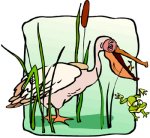
Worksheets and No Prep Teaching Resources
Reading Comprehension Worksheets
Earth Science

Earth Science
 Worksheets and No Prep Teaching Resources Reading Comprehension Worksheets Earth Science |
 Earth Science |
| edHelper's suggested reading level: | grades 9 to 10 | |
| Flesch-Kincaid grade level: | 10.27 |
|
Another "Ology"
By Trista L. Pollard |

|
 1 Who would have thought we would become a planet of "ologies"? There's biology, psychology, herpetology, etymology, and geology just to name a few. However, one "ology" truly helps us to understand the most important part of our planet- our environment. Ecology (which is filled with ecologists) is the study of ecosystems and the beings and organisms that inhabit those ecosystems. Just think, in addition to the bees, deer, and other organisms, you are important to ecologists.
1 Who would have thought we would become a planet of "ologies"? There's biology, psychology, herpetology, etymology, and geology just to name a few. However, one "ology" truly helps us to understand the most important part of our planet- our environment. Ecology (which is filled with ecologists) is the study of ecosystems and the beings and organisms that inhabit those ecosystems. Just think, in addition to the bees, deer, and other organisms, you are important to ecologists. |
Create Weekly Reading Books
Prepare for an entire week at once! |
| Leave your feedback on Another "Ology" (use this link if you found an error in the story) |
 |
Earth Science
|
 |
High School Reading Comprehensions and High School Reading Lessons
|